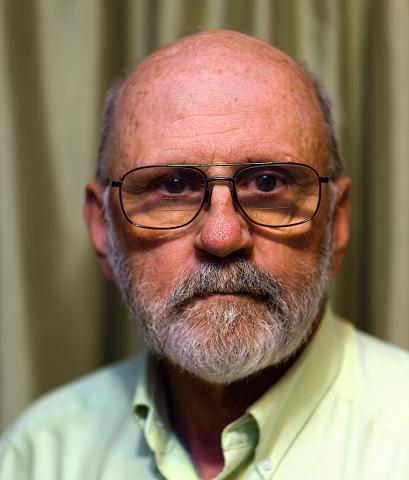
Aaron L. Mills
Active projects examine the microbial transformations of contaminants and trophic transfer of energy through microorganisms. A main line of inquiry deals with bacteria in the subsurfce (groundwater) environment. Current projects include field and laboratory investigations of hydrological factors controlling the transient removal of agricultural nitrate in sediments of low-relief coastal streams, and the role of autotrophic microbes in the dissolution of carbonates in submerged caves. Close collaboration with physical scientists (hydrologists, geochemists) is an important part of research in microbial ecology of the surface and subsurface. An additional line of research examines spatial relationships within microbial communities with respect how that structure determines the fulfillment of the microbe’s role in the ecosystem. Phenomena such as redundancy, congeneric homotaxis, stability, and resiliency are examined in model ecosystems that simulate natural microbial habitats to exploit microbial processes for renovation of domestic wastewater.
PUBLICATIONS
- Effect of tidal cycling rate on the distribution and abundance of Nitrogen-Oxidizing bacteria in a bench-scale fill-and-drain bioreactor
2018; Water (Switzerland); Battistelli, J.M. | Franklin, R.B. | Mills, A.L. - Riverine discharges to Chesapeake Bay: Analysis of long-term (1927–2014) records and implications for future flows in the Chesapeake Bay basin
2017; Journal of Environmental Management; Rice, K.C. | Moyer, D.L. | Mills, A.L. - Latitudinal variation in the availability and use of dissolved organic nitrogen in Atlantic coast salt marshes
2014; Ecology; Mozdzer, T.J. | McGlathery, K.J. | Mills, A.L. | Zieman, J.C. - Diel patterns in coastal-stream nitrate concentrations linked to evapotranspiration in the riparian zone of a low-relief, agricultural catchment
2014; Hydrological Processes; Flewelling, S.A. | Hornberger, G.M. | Herman, J.S. | Mills, A.L. | Robertson, W.M. - Biological control on acid generation at the conduit bedrock boundary in submerged caves: Quantification through geochemical modeling | Vpliv bioloških procesov na izvor kislin ob meji med kraškim prevodnikom in matično kamnino v zaliti coni: Kvantitativna ocena na osnovi geokemičnega modeliranja
2013; Acta Carsologica; Herman, J.S. | Hounshell, A.G. | Franklin, R.B. | Mills, A.L. - An approach for collection of Nearfield groundwater samples in submerged limestone caverns | Pristop za zbiranje vzorcev podzemne vode v potopljenih apnenčastih jamah
2013; Acta Carsologica; Mills, A.L. | Tysall, T.N. | Herman, J.S. - Estuarine Microbial Ecology
2012; Estuarine Ecology; Blum, L.K. | Mills, A.L. - Travel time controls the magnitude of nitrate discharge in groundwater bypassing the riparian zone to a stream on Virginia's coastal plain
2012; Hydrological Processes; Flewelling, S.A. | Herman, J.S. | Hornberger, G.M. | Mills, A.L. - Prediction of nitrate concentration in stream water based on watershed land use and stream flow rate
2009; Proceedings of World Environmental and Water Resources Congress 2009 - World Environmental and Water Resources Congress 2009: Great Rivers; Teng, J. | Olson, M. | Gurian, P. | Sofranko, A. | Herman, J. |... - Importance of spatially structured environmental heterogeneity in controlling microbial community composition at small spatial scales in an agricultural field
2009; Soil Biology and Biochemistry; Franklin, R.B. | Mills, A.L.
TEACHING
Physical Hydrology (EVSC 3600)
Studies the physical principles governing the flow of water on and beneath the earth's surface, including fundamental concepts of fluid dynamics applied to the description of open channel hydraulics, ground water hydraulics, and dynamics of soil moisture. Introduces elements of surface water and ground water hydrology and explores humanity's influence on its hydrological environment.
Soil Science (EVSC 4270)
Introduces the study of soils as a natural system. Topics include the fundamentals of soil chemistry, hydrology, and biology with respect to genesis, classification and utilization.
Global Biogeochemical Cycles (EVSC 4870)
Studies the processes that regulate the cycling of carbon, nitrogen, sulfur, and phosphorus within and between oceans, continents, and atmosphere.
Microbial Ecology (EVSC 5230)
Explores relationships of microorganisms to similar organisms, dissimilar (macro) organisms, and the physical-chemical environment to demonstrate basic ecological theory and indicate the importance of microbes in maintaining our world. Includes the organisms, microbial habitats, community formation and structure, interspecific relationships, nutrient cycling, and anthropocentric ecology.
Ecology of Pathogens (EVSC 5559)
Advanced Microbial Ecology (EVSC 7201)
Review and analysis of current research in microbial ecology.
Nature and Properties of Soils (EVSC 7559)